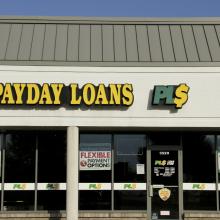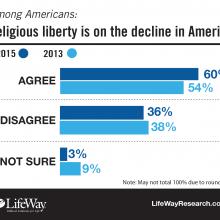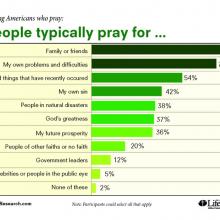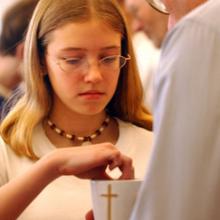Lifeway Research
At a Fourth of July concert hosted by First Baptist Church Dallas at the Kennedy Center in Washington, D.C., President Trump pledged never to forget the men and women who have served in the U.S. military — or the people of faith who put him in the White House.
“My administration will always support and defend your religious liberty,” Trump said at the event on July 1. “We don’t want to see God forced out of the public square, driven out of our schools, or pushed out of our civic life.”
The centerpiece of President Trump’s religious freedom agenda, and the carrot he often dangled in front of Christian leaders as he sought their support during the campaign, was a pledge to overturn a 1954 law that says houses of worship can lose their tax-exempt status if they engage in partisan campaigning.
But a new survey of evangelical leaders — mainly pastors whose flocks were crucial to Trump’s victory in November — shows that close to 90 percent of those asked opposed the idea of clergy endorsing politicians from the pulpit.
“It seems like most congregations are eager for somebody else to do the work of reconciliation,” said Scott McConnell, executive director of LifeWay Research, “rather than embrace it for themselves.”
The vast majority of pastors (90 percent) said their churches would welcome a sermon about racial reconciliation. But almost three-quarters of pastors — 73 percent — say they have not been encouraged by church leaders to preach about reconciliation. A quarter (26 percent) said they have been urged to address the issue from the pulpit.

Image via Ozgur Coskun/Shutterstock.com
The study comes in the same year that Larycia Hawkins — Wheaton College’s first black, female professor to receive tenure — parted ways with the evangelical flagship school after she posted on Facebook that both Christians and Muslims worship the “same God.” The controversy stirred fresh debate among evangelicals about whether all religions worship the same God, and whether God accepts the worship of all religions.

Image via REUTERS/Jessica Rinaldi/RNS
LifeWay Research has taken a close look at what might draw them in, zeroing in on people who say they have not attended a religious service in the past six months except for special events or holidays.
Worship? Not particularly interested, two in three people told the evangelical research firm in a survey released June 28.

Image via dcwcreations / Shutterstock.com
To a majority of Christians, those who provide payday loans, with their three-digit interest rates, are sinners. That’s among the findings of a new poll conducted by LifeWay Research , a Nashville-based Christian group, that surveyed 1,000 self-identifying Christians in 30 states with no regulations on payday lending.

Image via LifeWay Research
Most U.S. adults say religious liberty is declining in America and Christians face more intolerance than ever. But nearly 4 in 10 also say Christians “complain too much about how they are treated,” according to a new LifeWay Research survey.
According to a recent poll by The Associated Press and the University of Chicago’s National Opinion Research Center, 82 percent said religious liberty protections were important for Christians, compared with around 60 percent who said the same for Muslims and the religiously unaffiliated.
Yet, religious freedom is not merely an important issue — it is our “first freedom.” What Americans, especially Christian Americans, must understand is this: Religious freedom for some is not religious freedom for long.
Rejecting fearmongering about the resettlement of Syrian refugees in the U.S., about 100 evangelical leaders are calling on Christians and their churches “to support ministries showing the love of Jesus to the most vulnerable, those in desperate need, and the hurting.”
“Our statement is to change a narrative of fear and instead focus on faith and compassion,” said Ed Stetzer, executive director of LifeWay Research in Nashville, Tenn. “Our desire is not to resettle everybody in another country. When a house is burning down, we need to put out the fire and rescue people fleeing the fire.”

Graphic via LIfeWay Research / RNS
Americans are all for religious freedom — but disagree on who can claim it.
Diverse religious groups are recognized — but Christians and Jews are significantly more welcome than atheists, and many don’t see a welcome mat for Muslims. And not everyone means the same thing when speaking of a “Christian” nation.
So finds a new look at Americans’ religious self-image, detailed in a LifeWay Research survey released July 29.
The findings show that as many as 45 percent of Americans will look at the church brand on the sign out front — Catholic or Baptist or Methodist or whatever — and drive past, thinking it is “not for me.”
And yet, McConnell said, the survey reveals an openness in most people — if not a very theologically deep one — to stopping by, even if they declare no religious identity, the “nones.”
“Many people view a church like the ice cream parlor down the road. They think, ‘When I’m in the mood, I can go.’ Church leaders can take it as good news: People haven’t ruled them out. But they have to be a little unsettled at how little people are thinking about this,” said McConnell.
On the Rev. Martin Luther King Jr.’s birthday (Jan. 15), just as the civil rights drama Selma was nominated for best picture in the Oscar race, one fact of American life was little changed.
Sunday morning remains, as King once observed, the most segregated hour in America. And, against a backdrop of increased racial tensions, new research shows that most Americans are OK with that.
Two in three (66 percent) Americans have never regularly attended a place of worship where they were an ethnic minority, according to new polling analysis released by LifeWay Research.
“People like the idea of diversity. They just don’t like being around different people,” said Ed Stetzer, executive director of the Nashville, Tenn.-based research firm.
“Maybe their sense is that church is the space where they don’t have to worry about issues like this,” he said. But that could be a problem, because, Stetzer said, “If you don’t like diversity, you’re really not going to like heaven.”
Reading religion surveys can seem like confronting the Tower of Babel: stacked questions, confusing terms, unscientific methodology.
It gets even crazier when results are contradictory. How does that happen?
Some surveys lean like the Tower of Pisa
The Pledge of Allegiance is a perfect example.
There’s almost always a flap over how many Americans do — or don’t — want the words “under God” kicked out of the Pledge of Allegiance. Indeed, on Nov. 19 a court in Monmouth, N.J., will hear the case of the American Humanist Association battling the Matawan-Aberdeen Regional School District to have schools edit out mention of God.
The humanists claim 34 percent of Americans agree with their view. But, wait. What about a survey conducted earlier this year by LifeWay Research, a Christian research agency? It found that only 8 percent would cut God from the Pledge.
Why four times the difference? Look to the poll language.
LifeWay asked: “Should the words ‘under God’ be removed from or remain in the Pledge of Allegiance to the United States of America?” That’s a straight-up question with no preface.
The humanists’ survey, however, began with a bit of pointed Pledge history — before getting to the (loaded) question:
“For its first 62 years, the Pledge of Allegiance did not include the phrase ‘under God.’ During the Cold War, in 1954, the phrase ‘one nation, indivisible … ‘ was changed to read ‘one nation, under God, indivisible … ‘. Some people feel this phrase in our national pledge should focus on unity rather than religion.
When Americans aren’t busy praying for themselves or their own needs — and most of them are — many are seeking divine intervention on behalf of a favorite sports team or the golden ticket in the lottery, according to a new survey.
About 13 percent of Americans who pray say they pray for sports teams, compared with about one in five (21 percent) who say they have prayed to win the lottery, the new survey from LifeWay Research suggests.
A survey earlier this year from Public Religion Research Institute suggested that more Americans (26 percent) pray for their sports team, while more than seven in 10 (73 percent) say they have never done this.
Some of LifeWay’s new survey’s main findings include:
Protestant clergy rarely preach about mental illness to their congregations and only one quarter of congregations have a plan in place to assist members who have a mental health crisis, a new LifeWay Research survey found.
The findings, in a nation where one in four Americans have suffered with mental illness, demonstrate a need for greater communication, said Ed Stetzer, executive director of the evangelical research firm, a ministry of LifeWay Christian Resources, which is an agency of the Southern Baptist Convention.
When it comes to mental illness, researchers found:
- 66 percent mention it rarely, once a year, or never
- 26 percent speak about it several times a year
- 4 percent mention it about once a month
- 3 percent talk about it several times a month.
“When we look at what we know statistically — the prevalence of mental illness and the lack of preaching on the subject — I think that’s a disconnect,” said Stetzer.
In recent surveys, the religious “nones” — as in, “none of the above” — appear to lead in the faith marketplace. In fact, “none” could soon be the dominant label U.S. adults pick when asked to describe their religious identity.
And, researchers say, this is already making nones’ attitudes and opinions less predictably liberal on social issues.
The news that immigration reform may be dead—at least for this year—isn’t likely to sit well in many of America’s churches.
A new poll from Nashville-based LifeWay Research finds nearly six in 10 senior pastors of Protestant churches support immigration reform that includes a path to citizenship.
Many of those pastors hope reform will help them minister to more Hispanic Americans. But few say the current immigration system hurts current members of their flocks.
The poll of 1,007 senior pastors of Protestant churches, conducted Sept. 4-19, comes as immigration reform has stalled on Capitol Hill.
As online worship becomes more common in some churches, leaders within the United Methodist Church are debating whether the denomination should condone online Communion.
About 30 denominational leaders met last week after Central United Methodist Church in Concord, N.C., announced plans to launch an online campus that potentially would offer online Communion. Some nondenominational churches already offer online Communion, according to United Methodist News Service, but leaders urged the denomination’s bishops to call for a moratorium on the practice and do further study of online ministries.
The majority of the leaders agreed with the statement that Communion “entails the actual tactile sharing of bread and wine in a service that involves people corporeally together in the same place.” Not everyone, however, agreed that congregants must be in the same place.













